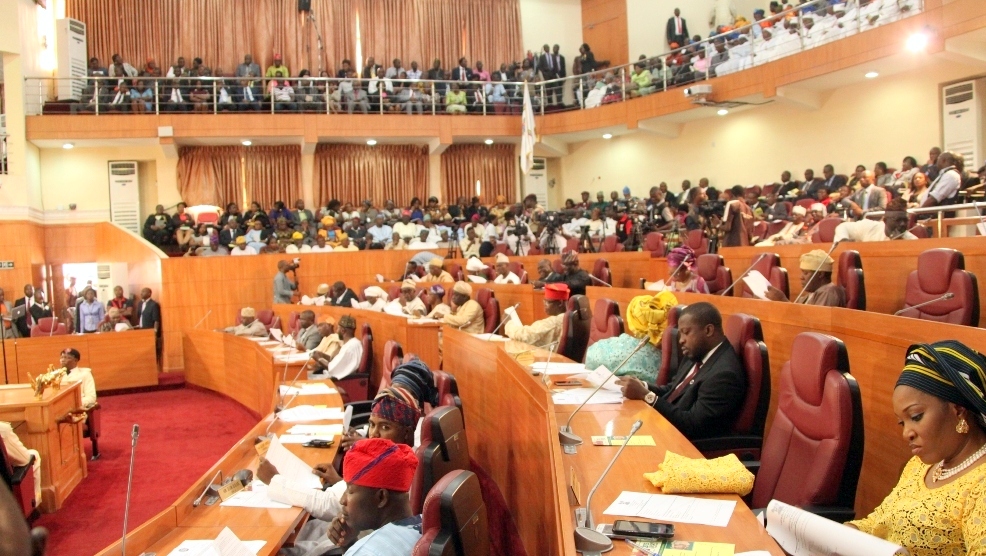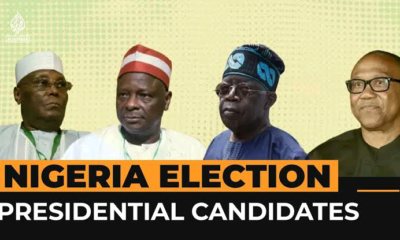Politics
2027: Reps Consider Bill To Bar Tinubu, Atiku, Obi
Published
2 months agoon
By
Admin
A bill seeking to impose age limit for persons contesting for the offices of the president and governor in Nigeria passed the second reading in the House of Representatives on March 27.
The bill, sponsored by Ikeagwuonu Ugochinyere, representing Ideato North/Ideato South Federal Constituency of Imo, seeks to amend Sections 131 and 177 of the 1999 Constitution.
It specifically proposes that individuals aspiring to these top executive positions – the president and governor – must not exceed 60 years at the time of contesting elections.
Another bill seeking to review the qualifications for contesting for the positions of president, vice-president, governor and deputy governor was also considered by the lawmakers.
This bill introduces a new educational qualification which requires candidates to have, at least, a university degree in their fields of study.
“A person shall be qualified for election to the office of the President if he has been educated up to, at least, university level and has earned a Bachelor’s degree in his chosen field of study,” it stipulates.
This, the lawmakers pointed out, was aimed at refining the leadership selection criteria in order to ensure a more robust governance framework for the country.
Aside the constitution stipulating that a presidential candidate must be a Nigerian by birth and belong to a political party, it also states that such a candidate must possess a school certificate and be, at least, 30 years old.
If the bill sails through, it will automatically put paid to the ambitions of several politicians who may be aspiring to contest for the post of president or governor in future elections.
Some prominent politicians, who may be affected by the bill, if it is eventually passed, include President Bola Tinubu, former Vice-President Atiku Abubakar, Mr Peter Obi, Sen. Rabiu Kwankwaso, Nasir el-Rufai and Adewole Adebayo, among others.
There are also some first term governors seeking for second term and other individuals aspiring to contest governorship election who will be automatically shut out.
Going by the spirit and letters of the bill, these individuals will not be able to contest for any election in Nigeria on account of their age.
The apparently controversial bill has since raised dusts by individuals and groups, most of whom have queried its necessity or appropriateness, particularly at this point in the country’s nascent democracy.
The arguments by those who are opposed to the bill centre on infringement on the constitutional rights of those who may be affected by the legislation.
They also maintain that such a bill, if it is allowed to sail through, is capable of narrowing the democratic space by limiting the choice of the electorate.
According to them, the move will ultimately affect the choice of elected leaders at both the federal and state levels.
For instance, while the Social Democratic Party (SDP) acknowledges the importance of involving youths in governance, it, however, maintains that leadership is still a function of experience, values and competence.
“Governance is a function of age in some sense. We have had very young people in leadership positions, from the military era till today.
“Some performed well, others did not. Age alone does not determine leadership success,” the SDP National Publicity Secretary, Rufus Aiyenigba argued.
While stressing the need for a structured system to assess leadership qualities in Nigeria, Aiyenigba proposed mandatory live debates for presidential candidates to evaluate their intellectual and emotional capacities.
“What is important is the quality a person is bringing. How do we assess capacity and competence?
“Why don’t we make live debates compulsory for presidential candidates? That way, the public can judge their intelligence, vision and fitness for leadership,” he said.
To the SDP publicity secretary, governance is not an entry-level job but a role requiring individuals who have been tested and prepared.
He, therefore, emphasised the need for a balance among energy, dynamism and experience in leadership.
Peoples Democratic Party (PDP) also criticised the lawmakers’ move, describing it as a misplaced priority.
The party indeed accused the legislators of focusing on trivial issues while neglecting more important ones affecting the lives of the ordinary Nigerian.
It argued that Nigeria’s main governance challenges lie in corruption, incompetence and lack of patriotism rather than age.
Lending its own voice, an NGO, Peering Advocacy and Advancement Centre in Africa (PAACA), said restricting individuals from contesting elections would infringe on their constitutional rights.
PAACA’s Executive Director, Ezenwa Nwagwu, in an interactive session with newsmen in Abuja, said democracy should be about inclusivity, not exclusion.
“Denying anyone the right to contest based on age alone shrinks the democratic space,” he argued.
According to Nwagwu, there is no scientific evidence to suggest that individuals below 60 years perform better in office than those above that age.
The executive director stated that leadership should be about competence, vision and ability to deliver rather than about an arbitrary age limit.
He also argued that educational qualifications of those contesting for the two political offices do not necessarily guarantee good governance or their better performance in office.
“The drafters of the 1999 Constitution deliberately set the educational requirement at the ability to read and write to promote inclusivity.
“There are countless examples of individuals with high academic qualifications who have failed in leadership, just as there are those with minimal formal education who have excelled.
“The focus should be on capacity, integrity and competence,” he stated.
In his own response, the PDP National Youth Leader, Timothy Osadolor, says that the country’s issues are not related to age.
“The problem we have is that of incompetence and lack of capacity; the problem we have is that of corruption.
“So, instead of focusing on what the issues are, they are majoring on the minor and ‘minoring’ on the major things; it is a misnomer.
“We have seen in the likes of India; we have seen the guys running what we call Singapore currently; none of them is less than 60 and they are making fantastic efforts to develop their countries.
“Age is not a factor; we saw it in America; it is not the issue; for me, I believe that even age comes with wisdom; so, age should not limit anybody,” he said.
Osadolor urged the lawmakers to focus on major things and leave things like this so that they don’t appear to be embarrassing themselves.
Meanwhile, the Coalition of United Political Parties (CUPP) highlighted corruption, incompetence and lack of patriotism as some of the banes of Nigeria’s governance.
The CUPP National Publicity Secretary, Mark Adebayo, said that even if the affected individuals were in their thirties, they would still behave the same way—or even worse.
“It is not about age; it’s about who they are—evil, opportunistic, corrupt and incompetent,” he said.
Adebayo cited the former United States President, Joe Biden, his successor, Donald Trump and Singapore’s founding leader, Lee Kuan Yew, as examples of those who impacted their countries positively, notwithstanding their advanced age.
To him, there is absolutely no need for such age limit in seeking election to the offices of the president and the governor.
However, a professor of Political Science, Prof. Abubakar Oladeji, said even though the proposal looks good on the face value, it would require more nuance analysis in order to bring out its merits and demerits.
“The first question to ask is: whether or not age should be a yardstick for leadership, and the answer is not far-fetched.
While it could be argued that age comes with experience and maturity, we should also consider the fact that the proposal is a further extension to the #Not too young to run Act, signed into law in 2018.
“It is another good way of granting more political space to the youth and a way of empowering them to take the destiny of their fatherland in their own hands.
“We are living witnesses to how the youth are making waves with their incredible leadership qualities in other parts of the world, in Europe and Asia in particular.
“What we should worry about is: do Nigerian youths have the discipline and maturity, and do they possess quality leadership as displayed in other countries where their contemporaries are occupying leadership positions?” he said.
Oladeji, who is the Head, Political and Governance Policy Department, Nigerian Institute of Social and Economic Research (NISER), Ibadan, said the questions had become necessary, given the terrible experiences of some of the youths who had, at one time or the other, been involved in governance in Nigeria.
He, therefore, called for inputs from citizens who are supposed to be beneficiaries of the proposal if it sailed through.
Analysts have, however, suggest adequate and transparent public hearings at all levels of government on the propose.
This, they say will allow those behind the proposal to gauge the opinions of Nigerians on the necessity or otherwise of the 60-year age limit for president and governors.
While commending the House of Representatives for raising the issue, they say it is a sensitive matter that should be handled with caution in order not to overheat the polity.(NAN)








